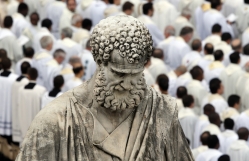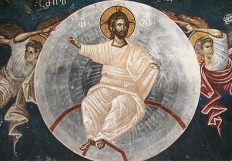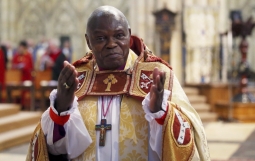
The first Christian Pentecost is often called the 'birthday of the Church'. It's when a confused rabbled of bewildered disciples truly became 'apostles', sent out to build the Church and change the world. Instead of relying on their own understanding of Jesus' commands and their own strength of mind in keeping them, they would from that moment on be powered by an inner force. God sent his Spirit to dwell within them so that they would be capable of more than they ever dreamed possible.
The story is told in Acts 2:1-13 and it still speaks to the Church today.
The coming of the Spirit was marked by three signs: the blowing of a "violent wind" (verse 2), tongues of fire that separated and came to rest on each of them (verse 3) and the ability to speak in other languages (verse 4). Each of them has something to show us.
1. The "violent" or "mighty" wind is a reference to the nature of the Spirit. In both Hebrew and Greek the word for spirit is the same as the word for 'breath' or 'wind'. In the story of Elijah in 1 Kings 19:11-13, there is a "great and strong wind", but "the Lord was not in the wind"; instead he's in a "still small voice". Acts, though, uses the wind as a sign of God's presence, not of his absence. The stress is on the power of the Spirit. The apostles needed to know that nothing was beyond them if God dwelt within them.
2. The tongues of fire "separated and came to rest on each of them". The implication is that there is one flame that divides among them all. And this is a peculiarity of fire: light one candle or more from another and the flames are indistinguishable. They have one origin but exactly the same power to shed light and to burn. This too is a symbol of the work of the Spirit, not just for the apostles but for the Church today. We look up to the great heroes of the past, but we are not less than they were, because the Spirit is the same. We admire great women and men of God today, but we have the same Spirit in our own hearts.
3. They were enabled to speak in tongues. This is often assumed to be the "speaking in tongues" used in charismatic or Pentecostal churches and this does seem to have been a feature of early Christian worship (1Corinthians 14:1-25). But it's likely that Luke, who wrote Acts, has something quite different in mind here. He implies that people around, from all sorts of different countries, could understand what the apostles were saying. In other words, the Genesis curse of Babel (11:1-9), which separated human beings from one another and broke them into competing tribes, has been reversed. There is a new kind of unity in the Spirit. For us today this means remembering our solidarity with our Christian brothers and sisters, working to bring peace and harmony to God's world, and always seeking to communicate the gospel in ways that will be understood and believed.
When we come to celebrate Pentecost on Sunday, we will not just be remembering a past event. We will be celebrating a living reality in which God comes to his people in power. And praying for God to renew us in the way he renewed the first apostles is a very daring thing to do. He might take us at our word, and who know how He will use us or where He will send us?
Follow Mark Woods on Twitter: @RevMarkWoods

















